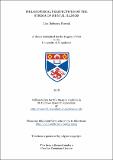Files in this item
Philosophical perspectives on the stigma of mental illness
Item metadata
| dc.contributor.advisor | Hawley, Katherine (Katherine Jane) | |
| dc.contributor.author | Nowak, Lisa Rebecca | |
| dc.coverage.spatial | 279 p. | en_US |
| dc.date.accessioned | 2018-04-24T11:15:16Z | |
| dc.date.available | 2018-04-24T11:15:16Z | |
| dc.date.issued | 2018-06-28 | |
| dc.identifier.uri | https://hdl.handle.net/10023/13193 | |
| dc.description.abstract | This thesis is concerned with philosophical perspectives on the stigma of mental illness, with each chapter exploring different philosophical issues. Chapter one delineates the central concept around which the rest of the work revolves: the stigma of mental illness. It provides an outline of the stigma mechanism, how it applies to mental illness, why it is such a large public health concern and what has been done so far to combat it. Chapter two is concerned with the application of recent literature in the philosophy of implicit bias to the topic of mental illness. It suggests that we have hitherto been preoccupied with explicit formulations of the stigma mechanism, but argues that there are distinctive issues involved in combatting forms of discrimination in which the participants are not cognisant of their attitudes or actions, and that anti-stigma initiatives for mental illness should take note. Chapter three applies the philosophical literature concerning the ethics of our epistemic practices to the stigma of mental illness. It contains an analysis of how epistemic injustice- primarily in the forms of testimonial injustice and stereotype threat- affects those with mental illnesses. The fourth chapter brings in issues in the philosophy of science (particularly the philosophy of psychiatry) to explore the possibility of intervening on the stigma process to halt the stigma of mental illness. The first candidate (preventing labelling) is discounted, and the second (combatting stereotype) is tentatively endorsed. The fifth chapter is concerned with how language facilitates the stigma of mental illness. It suggests that using generics to talk about mental illness (whether the knowledge structure conveyed is inaccurate or accurate) is deeply problematic. In the former, it conveys insidious forms of social stereotyping. In the latter, it propagates misinformation by presenting the category as a quintessential one. | en_US |
| dc.language.iso | en | en_US |
| dc.publisher | University of St Andrews | |
| dc.rights | Attribution-NonCommercial-NoDerivatives 4.0 International | * |
| dc.rights.uri | http://creativecommons.org/licenses/by-nc-nd/4.0/ | * |
| dc.subject | Generics | en_US |
| dc.subject | Philosophy of psychiatry | en_US |
| dc.subject | Mental illness | en_US |
| dc.subject | Stigma | en_US |
| dc.subject | Epistemic injustice | en_US |
| dc.subject | Implicit bias | en_US |
| dc.subject | Classification | en_US |
| dc.subject.lcc | RC437.5N7 | |
| dc.subject.lcsh | Mental illness--Social aspects | en |
| dc.subject.lcsh | Psychiatry--Philosophy | en |
| dc.subject.lcsh | Stigma (Social psychology) | en |
| dc.title | Philosophical perspectives on the stigma of mental illness | en_US |
| dc.type | Thesis | en_US |
| dc.contributor.sponsor | Scottish Graduate School for Arts and Humanities (SGSAH) | en_US |
| dc.type.qualificationlevel | Doctoral | en_US |
| dc.type.qualificationname | PhD Doctor of Philosophy | en_US |
| dc.publisher.institution | The University of St Andrews | en_US |
The following licence files are associated with this item:
This item appears in the following Collection(s)
Except where otherwise noted within the work, this item's licence for re-use is described as Attribution-NonCommercial-NoDerivatives 4.0 International
Items in the St Andrews Research Repository are protected by copyright, with all rights reserved, unless otherwise indicated.


